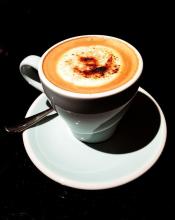Varieties of coffee trees in coffee producing areas of St. Helena
On May 21, 1502, while returning northward from the Cape of good Hope and crossing the South Atlantic, the battleship of Portuguese Captain Nova discovered an unnamed island. Nova named the island St. Helena.
When St. Helena was discovered, Europeans did not know what coffee was, and there were no coffee trees in Asia and Latin America, but the new drink Kawa, which is brewed in coffee fruit, was becoming popular in Yemen, and the Arab world was caught in a craze of cava. Europeans still like beer and wine as usual.
In 1732, in order to catch up with the coffee transplant craze, the British East India Company acquired bourbon coffee trees from the Yemeni mocha and randomly planted them on the British island of St. Helena. In 1815, when Napoleon was defeated at Waterloo and put under house arrest in St. Helena, this kind of coffee had a chance to be known.
After Napoleon died of illness in 1821, the delicacy of St. Helena coffee was spread, and it is still one of the most expensive manor coffee in the world. St. Helena produces only 2-12 tons of raw beans a year, which is rarer than the 700-1000 tons in the Blue Mountains of Jamaica. St. Helena coffee costs $55 a pound, which is more expensive than the Blue Mountains. It's really too expensive!
If you plant flowers intentionally, you will not blossom, but you will not plant willows unintentionally. There are a lot of coincidences in this world, and maybe you will, too.
Coffee is always inextricably related to history, wind and wind, and great men. St. Helena is famous for Napoleon. St. Helena coffee is very desirable because of Napoleon. Unfortunately, this kind of coffee always makes people feel mysterious. What kind of taste is Napoleon so praised? Not everyone has a chance to taste it. Coffee lovers who have tasted a lot of gourmet coffee may not have Napoleon's feelings. In many cases, coffee represents a kind of mood. Napoleon's mood may be lonely. Because of loneliness, they send out such feelings on this lonely island: the only good thing on this island is coffee. It is also so noble but also living on an isolated island. Perhaps coffee is Napoleon's confidante. Although the area is small and the cultivation of coffee is relatively small, coffee growers on the island still attach great importance to or love coffee. There was also a coffee improvement movement on St. Helena in the 1980s to produce better coffee. In fact, St. Helena's coffee cultivation is completely natural, without mechanical participation, coupled with the need to protect the island's special species, special natural conditions, pure natural coffee cultivation is a kind of high quality, as St. Helena's coffee is getting more and more praise from people all over the world, coffee growers and producers on the island intend to expand the scale appropriately. Let more people have the opportunity to taste this rich aroma and slightly sweet St. Helena coffee.
Of course, as to whether Napoleon had a good cup of coffee in St. Helena, you can make up for it, and the production process also plays an important role in the quality of the coffee. After peeling and drying, workers sort the coffee beans according to their quality and size, so as to ensure that each bean can be heated evenly when it is roasted. St. Helena introduced coffee trees from Yemen in 1733 and has been widely planted ever since. The coffee trees here rely entirely on natural conditions for planting and growth, realizing absolute green organic cultivation. The unique taste of St. Helena coffee mainly depends on several factors. First of all, St. Helena is a volcanic island, and its plantation is different from the outside world. Secondly, due to the relatively independent geographical location of the island, bees are unable to cross-pollinate, which retains the original flavor of coffee on the island; in addition, the southeast trade wind affects the salinity in the air. At the same time, fertilizers such as seabird droppings also provide special nourishment for the growth of coffee trees in the vast South Atlantic Ocean, there is a volcanic island-St. Helena Island. The population living here is about 6000, and the land area is about 122square kilometers, which is much smaller than Zhoushan Island in Zhejiang Province. Anyone familiar with European history knows that this is Napoleon. Where Bonaparte was exiled for the rest of his life. However, if you happen to know a lot about coffee, you may know that St. Helena is also a producer of premium coffee. Napoleon believed that the only good thing from the island was coffee.
St. Helena (St Helena) is located in the Atlantic Ocean, 2000 km from Africa and 3500 km from Brazil, with a population of about 5000. Of course, the island is famous because Napoleon was exiled after the Battle of Waterloo in 1815 and died on the island in 1821.
Coffee was first grown on the island of St. Helena in 1732 and was transported from Yemen on a ship called the Houghton. Although some other introduced plants have failed since the 1860s, coffee has taken root and flourished here.
The island also experienced a coffee improvement movement, where in the mid-1980s, David? David Henry began to devote himself to the development of the coffee industry on the island in order to produce the best quality coffee. Coffee trees on St. Helena are planted entirely on natural conditions, with no machinery, no tractors, and even miscellaneous trees that have been cut down to make room for new coffee trees are recycled.

Important Notice :
前街咖啡 FrontStreet Coffee has moved to new addredd:
FrontStreet Coffee Address: 315,Donghua East Road,GuangZhou
Tel:020 38364473
- Prev

The country profile of C ô te d'Ivoire affects the growth of the coffee industry in the country
(I) popular Front of C ô te d'Ivoire (Front Populaire Ivoirien): PFDJ for short. The ruling party. It was officially founded by incumbent President Laurent Gbagbo in France in March 1983. At present, there are about 800000 party members, and the backbone are intellectuals and young students. It has a great influence in the central and western regions dominated by the Crux nationality and the capital Abidjan. Advocate equality, freedom, justice and multi-party democracy
- Next

Introduction of coffee flavor characteristics in coffee producing area of Uganda, a coffee producing country
When ships take the place of sailboats, people drink relatively fresh coffee beans because of the shortened delivery time. But people who are used to drinking Chen beans are not used to the fresh taste, so they desperately pursue old Java coffee, so that the Indonesian government and some businessmen deliberately store fresh beans in warehouses for one or two years and then sell them to consumers. In fact, compared with fresh beans, aged java bean acid
Related
- Does Rose Summer choose Blue, Green or Red? Detailed explanation of Rose Summer Coffee plots and Classification in Panamanian Jade Manor
- What is the difference between the origin, producing area, processing plant, cooperative and manor of coffee beans?
- How fine does the espresso powder fit? how to grind the espresso?
- Sca coffee roasting degree color card coffee roasting degree 8 roasting color values what do you mean?
- The practice of lattes: how to make lattes at home
- Introduction to Indonesian Fine Coffee beans-- Java Coffee producing area of Indonesian Arabica Coffee
- How much will the flavor of light and medium roasted rose summer be expressed? What baking level is rose summer suitable for?
- Introduction to the characteristics of washing, sun-drying or wet-planing coffee commonly used in Mantenin, Indonesia
- Price characteristics of Arabica Coffee Bean Starbucks introduction to Manning Coffee Bean Taste producing area Variety Manor
- What is the authentic Yega flavor? What are the flavor characteristics of the really excellent Yejasuffi coffee beans?

